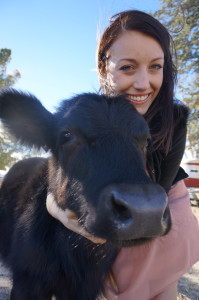Will Potter's Blog, page 14
January 25, 2014
FBI Warns that Journalism About Animal Cruelty Could “Incite Criminal Activity”
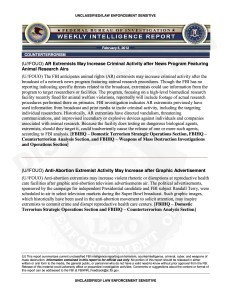 New documents released by Anonymous reveal that the FBI has sent out a terrorism warning that a news program, which featured video footage of a lab cited for animal welfare violations, may “incite criminal activity.”
New documents released by Anonymous reveal that the FBI has sent out a terrorism warning that a news program, which featured video footage of a lab cited for animal welfare violations, may “incite criminal activity.”
The documents were obtained by hackers calling themselves “Team Berserk,” and include intelligence bulletins from Department of Homeland Security fusion centers. The document dump included a weekly intelligence bulletin distributed by the FBI to counterterrorism units about “animal rights extremists.”
The February 6, 2012 bulletin warns of a network news broadcast about a biomedical facility that has been fined for animal welfare violations. It included “footage of actual research procedures performed there on primates.”
The FBI bulletin does not identify the news program, but at about this time NBC News’ “Rock Center” aired a report, “A question of freedom for chimpanzees who spend lives in research labs.” Two chimpanzees featured in the broadcast were infected with viruses and subjected to dozens of painful procedures. As Jane Goodall commented in the report: “Remember we’re talking about our closest living relatives with brains so sophisticated that they can do a lot of problems on a computer with a touchpad, faster than secondary school students. That’s how bright they are.”
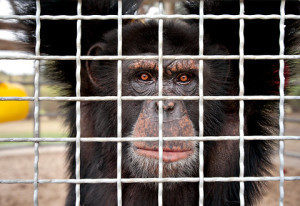 As NBC noted, their “quality of life is a matter of intense debate and part of the emotional argument over whether experimenting on chimps is morally and scientifically justified to save human lives.”
As NBC noted, their “quality of life is a matter of intense debate and part of the emotional argument over whether experimenting on chimps is morally and scientifically justified to save human lives.”
In other words, it’s an important issue that needs investigation and discussion; it’s exactly the type of reporting news outlets should be doing.
It’s especially troubling that the FBI is warning that journalism can inspire “criminal activity,” because the bulletin openly states “the FBI has no reporting indicating specific threats related to the broadcast.” It’s a dangerous and unconstitutional argument, and part of the growing crackdown on whistleblowers, investigators, and journalists who expose animal cruelty. The FBI simply has no business sending out counter-terrorism warnings about the press.
Beyond that, though, these absurd efforts directly put public safety at risk.
Just look at another FBI intelligence bulletin released by Anon. It’s titled, “Wichita-Based Homegrown Violent Extremist Arrested for Attempted Use of a Weapon of Mass Destruction at a Wichita Area Airport.”
This is the state of the government’s “terrorism priorities.” Favorable media coverage exposing animal cruelty–at a lab that was fined for abuses–is on par with weapons of mass destruction.
January 24, 2014
Pro-choice? You Should Still Oppose Abortion Clinic Anti-Protest Laws. Here’s why:
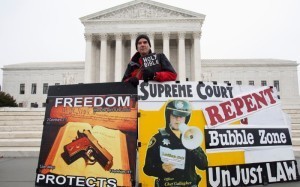 The Supreme Court recently heard oral arguments about a Massachusetts law that prohibits anyone from entering a 35-foot “buffer zone” around abortion clinics. The target of the law is anti-abortion protesters who protest at clinic entrances. I spoke with Kirsten Powers of the Daily Beast recently about how these types of restrictions on freedom of speech place all protesters at risk. Her great column sums up the danger: “If it’s upheld, unions and environmentalists could be next.”
The Supreme Court recently heard oral arguments about a Massachusetts law that prohibits anyone from entering a 35-foot “buffer zone” around abortion clinics. The target of the law is anti-abortion protesters who protest at clinic entrances. I spoke with Kirsten Powers of the Daily Beast recently about how these types of restrictions on freedom of speech place all protesters at risk. Her great column sums up the danger: “If it’s upheld, unions and environmentalists could be next.”
If you are pro-choice, it’s tempting to support a law like this. Anti-abortion protesters have a history of violence and bloodshed against doctors and clinic workers, and protests at clinics have at times escalated to harassment and intimidation of women who are attempting to exercise their rights. I completely support the right of all women to make their own decisions about their bodies and their health care, but I’ve seen firsthand the dangers of singling out people with new legislation because of what they believe.
Here’s an excerpt:
Ironically, a law championed by liberals could end up having dire implications for many liberal causes. Will Potter is a journalist and author of Green is the New Red: An Insider’s Account of a Social Movement Under Siege, which chronicles the political, legal, and public relations strategies that threaten even acts of nonviolent civil disobedience. He told me that the Massachusetts bill, “is setting the precedent of applying this approach to the animal rights and environmental movements.” Despite being pro-abortion rights, Potter says of the abortion clinic buffer zone, “I would oppose these kinds laws [because] it’s about restricting speech.” He points out that, “Oregon passed a law to allow loggers to sue protestors who disrupt business using the same kind of language…it’s identical…to [the Massachusetts law].”
If the Supreme Court were to uphold the Massachusetts law, it’s not hard to imagine businesses lobbying to create zones where union members are not allowed to speak, but workers for the business are.
Businesses could use the same logic used in McCullen: the picketers are disrupting business and upsetting customers. So, government, please silence them—even though they are standing on a public sidewalk.
Potter described how liberal activists have made this mistake before. He said, “Back in the late 1990s…Planned Parenthood was using RICO statutes against anti-abortion protestors. A lot of civil rights people were saying this is going to come back around to us and sure enough RICO has been used against animal-rights protestors. The [lawsuits] have failed, but it costs mountains of cash to defend against.”
Read the full article: “Anti-Free Speech Zones Used to Silence Pro-Lifers Could Come Back to Haunt Liberals”
January 21, 2014
Interview with a Fugitive: Captain Paul Watson
My new article for VICE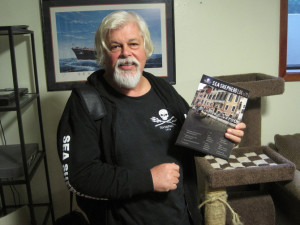 :
:
It’s not easy to interview an international fugitive. After encrypted emails, phone calls from unknown numbers, last minute travel plans changed—in multiple countries—I eventually found myself sitting across from Sea Shepherd’s Captain Paul Watson sharing vegan lemon chicken and Szechuan noodles and talking about desert islands like nothing could be more normal.
For 15 months, the internationally-known environmentalist and star of the Animal Planet reality show Whale Wars has been on the run. He fled Germany in July, 2012, because he was facing extradition to Costa Rica, where he was wanted on charges related to a confrontation with shark-finners on the high seas in Guatemalan waters. Watson says he could never get a fair trial there, and his life could be at risk, so he took to the sea.
The anonymous volunteers who helped him called it “Operation Unknown.” Some started calling it “Operation Where’s Waldo.”
While Watson was on the run, Sea Shepherd’s crew had to prepare for their latest campaign against Japanese whaling in the Southern Ocean. The future of Watson, and the organization, was unknown, but there was no use worrying about all that, Watson said: “I don’t do stress.”
Watson is known for his speeches, and if there’s one upside of running for your life it’s the accumulation of new stories. There was the time in Tonga when he and his crew traded canned goods with villagers for fresh produce, and then got lured into a free lunch with Mormons. Or when they steered a Zodiac toward a small island for a camping trip, but didn’t see a rock wall hidden by waves, flipped, and almost drowned.
There were coconuts. “So many coconuts,” he said. And killer wasps: When they attacked Watson, he bolted into the jungle and got lost.
On another Pacific island they experimented with kava, a traditional drink with pyschoactive properties. It didn’t work. “It’s like trying to drink sawdust that has been filtered through a gym sock,” Watson said.
In my attempts to arrange an interview, I had hoped for a rendezvous at sea, or at least some coconuts. But I finally caught up with him in Seattle at one of his favorite restaurants, Bamboo Garden.
A few days before, he found out Interpol’s “Red Notice” had been dropped. He was no longer wanted. He came ashore in California, and alerted customs. Watson expected to be stopped and interrogated, but the only question from customs officers was how they could get some Sea Shepherd T-shirts.
Watson was laughing, and his crew said it’s the happiest they have ever seen him. He told me about reuniting with his daughter and 18-month-old-grandaughter, who he last saw when she was a month old, and he was glowing. At one point during dinner, a couple of fans at another table excitedly said “Hi Paul Watson!” and waved. For a few moments, it felt like this incognito adventure was over.
Then we stepped outside. There was a new black pickup truck in the parking lot, covered with Sea Shepherd logos. I jokingly asked him, “Which car is yours?” He stopped at the edge of the lot, and started the truck’s engine with a remote control. “I got that to make sure there isn’t a car bomb,” he said flatly.
Watson’s fugitive days may have ended, but this fight is far from over.
The U.S. chapter of the Sea Shepard Conservation Society, as his group of sailors who harass illegal whaling boats is officially known, has been mired in a legal battle with Japanese whalers since March of 2012. Despite harrowing video showing the whalers attempting to crush the Sea Shepherd’s Bob Barker between two much larger ships, the whalers say they are the victims of “extremists” and filed an injunction in U.S. court to stop them.
In a ruling for the 9th Circuit Court of Appeals, Judge Alex Kozinski agreed and said “you don’t need a peg leg or an eye patch” to be a pirate. Now Sea Shepherd and its board of directors are trying to prove that they haven’t violated that injunction with their protests.
“Our support base doesn’t come from the ‘left’ or the ‘right.’ We’re in front,” Watson says. “The injunction is an attempt to destroy [our grassroots] support.”
Animal Planet has pulled back on its popular Whale Wars program, and scaled the series down to a two-hour feature this year.
Watson has been forced to step down from the helm he occupied for 35 years. Much of the court proceedings, which seek over $2 million in penalties, have been focused on whether or not he actually has pulled back from the whaling campaign. On one emotional day in court, his daughter Lani Blazier testified about his decision with tears in her eyes: “This is a man who gave up pretty much my entire childhood to do what he is doing… The fact that he’s doing this now shows he’s not taking these charges lightly.”
The legal fight has forced Sea Shepherd to decentralize and regroup. “This is a global movement,” Sea Shepherd Captain Alex Cornelissen tells me, listing off names of chapters: Austria, Switzerland, Brazil, Chile, Costa Rica, Denmark, Sweden, Norway, South Africa, the list goes on and on. “They’re sprouting up everywhere.”
Right now Sea Shepherd volunteers—sans Captain Watson—are chasing the whalers out of the Southern Ocean Whale Sanctuary. But as they grow more effective, the backlash from the Japanese is only going to intensify. A fundraising plea said that “the courtroom battles… are a fight for the very soul of Sea Shepherd.”
“The future hides in the fog, the present endures,” Watson wrote in a poem he recently posted to Facebook.
“But at these times I let the wind set the course, knowing that the ship will carry on as it may.”
Will Potter is a journalist and TED Fellow based in Washington DC. Visit his website and follow him on Twitter.
January 16, 2014
“The American animal industry is scared.”
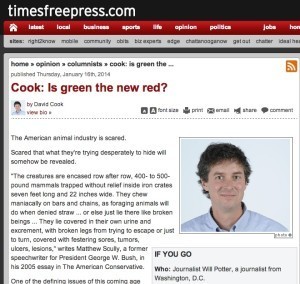 There’s a fantastic column in the Chattanooga Times Free Press today about ag-gag laws and my lecture this evening. David Cook sums it up in the first line as “The American animal industry is scared. Scared that what they’re trying desperately to hide will somehow be revealed.” Here’s an excerpt:
There’s a fantastic column in the Chattanooga Times Free Press today about ag-gag laws and my lecture this evening. David Cook sums it up in the first line as “The American animal industry is scared. Scared that what they’re trying desperately to hide will somehow be revealed.” Here’s an excerpt:
Potter, a journalist from Washington D.C., is coming to Chattanooga today to speak about some of our most urgent issues: ethics, animals, First Amendment rights and democracy. His free talk — “The Criminalization of Dissent” — is being sponsored by several social justice and animal welfare groups and begins at 6 p.m. on the Fourth Floor of the Chattanooga Public Library.
“In terms of an entire industry that is raising and killing upward of 9 billion animals a year, there is virtually no oversight and no regulation,” said Potter, a 2014 TED Fellow…
“We all want to think we’re part of a culture that values justice and fairness,” Potter said. “It doesn’t matter if you’re a vegetarian or environmentalist, these things we’re talking about cut to the heart of fairness in our legal system, accountability and people in power.”
January 15, 2014
If anyone deserves to be called domestic terrorists, it’s… babies.
 They leave a trail of diapers, sleepless nights, and general household destruction in their wake. If anyone deserves to be called “domestic terrorists,” it’s… babies.
They leave a trail of diapers, sleepless nights, and general household destruction in their wake. If anyone deserves to be called “domestic terrorists,” it’s… babies.
New parents have been victimized by these bullies for far too long.
Stand up! Fight back! Your sick sense of humor will help keep GreenIsTheNewRed.com running.
Multiple sizes of these onesies based on the size of your terrorist. Yellow one-piece with green print.
$20
Select a Size
Newborn
6 month
12 month
18 month
24 month
Check out the other items available in the GreenIsTheNewRed.com store.
January 13, 2014
Entrevista a Will Potter, autor del libro “Los verdes somos los nuevos rojos”
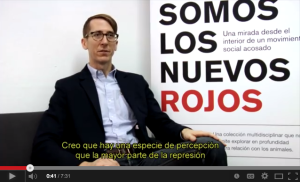 When I was in Madrid, I filmed this video interview about Los Verdes Somos Los Nuevos Rojos (the newly released Spanish translation of the book) and how these repressive measures are spreading internationally.
When I was in Madrid, I filmed this video interview about Los Verdes Somos Los Nuevos Rojos (the newly released Spanish translation of the book) and how these repressive measures are spreading internationally.
It’s available here with Spanish subtitles.
Special thanks to Plaza y Valdés Editores!
January 11, 2014
BREAKING: Charges Dropped Against Investigator Who Filmed Animal Cruelty
Photo courtesy of Hooves & Paws Animal Rescue.
In yet another blow to the ag industry’s attempts to silence whistleblowers, the charges against an undercover investigator who filmed cruelty against farm animals have been dropped.
Taylor Radig had worked undercover at a cattle company, documenting animal welfare abuses for the animal rights group Compassion Over Killing. The investigation led to criminal charges against three farm workers. And then in an unprecedented move, Radig was prosecuted for animal cruelty as well.
[To learn more, read this in-depth interview with Taylor Radig: "I witnessed and reported animal abuse… and now was being charged with a crime myself.”]
After public outrage — including nearly 200,000 petition signatures on Change.org — the Weld County District Attorney’s Office in Colorado announced it was dropping all charges.
In a brief statement, prosecutor’s said: “While the Sheriff’s Office determined that probable cause existed to believe that Ms. Radig committed that offense, the District Attorney’s Office evaluates a case based on whether the charges can be proven beyond a reasonable doubt. The District Attorney’s Office has concluded that the charges can’t be proven beyond a reasonable doubt and therefore those charges have been dismissed against Ms. Radig.”
The announcement is another defeat for Big Ag groups, which have attempted to criminalize similar investigations. “Ag-gag” bills were defeated in every state they were introduced last year. And the first ag-gag prosecution was also dismissed after public outrage. More bills are already appearing, though.
January 9, 2014
I’m Speaking in Chattanooga on Ag-Gag Laws…
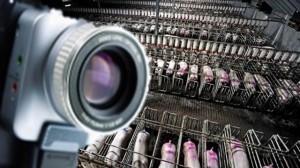 Looking forward to this! If you know folks in the area, please share (here or the Facebook event)!
Looking forward to this! If you know folks in the area, please share (here or the Facebook event)!
Will Potter, award-winning independent journalist based in Washington, D.C. and author of “Green Is The New Red: An Insider’s Account of a Social Movement Under Siege,” will be speaking in Chattanooga on Thursday, Jan. 16 at 6 p.m.
How did animal rights and environmental activists come to be targeted as “eco-terrorists” and labeled as the top domestic terrorist threat by the FBI? What is the connection between the criminalization of animal rights/environmental activism and the potential threat to corporate profits? What are the consequences for those working in the animal rights/environmental movements, and what are the risks for social justice activists in general?
More specifically, Potter will address “ag gag” legislation, which will likely be re-introduced into the Tennessee General Assembly in 2014.
“Ag gag” legislation was passed by the Tennessee General Assembly in 2013, but Gov. Haslam vetoed the bill after the state attorney general warned that the bill was “constitutionally suspect.” The bill’s sponsors, Sen. Dolores Gresham, R-Somerville and Rep. Andy Holt, R-Dresden, pledged to re-write the bill and re-introduce it in 2014.
“Ag gag” bills attempt to “censor whistleblowers, investigators, and journalists who expose animal welfare abuses on factory farms and slaughterhouses,” Potter writes on his blog. “Investigations by groups like the Humane Society, Mercy for Animals, and Compassion Over Killing have exposed shocking animal cruelty and consumer health dangers in the food industry. They have led to the largest meat recall in US history, criminal charges, and international media exposure. Rather than put a stop to these abuses, corporations are trying to criminalize the whistleblowers who expose them.”
Potter blogs at www.greenisthenewred.com. His work has been published in the Los Angeles Times, Mother Jones and the Vermont Law Review. He has also testified before Congress.
Potter is also one of the 2014 TED Fellows.
This event will be an important overview and discussion for anyone working on issues surrounding animal rights, the environment, food labeling, and social justice in general, as well as anyone concerned about corporate power, free speech restrictions and First Amendment issues.
The event is free and open to the public and will be on the Fourth Floor of the Chattanooga Public Library.
Hosting the event are Mercy Junction, Occupy Chattanooga, Animals Vote Tennessee, Move to Amend Chattanooga, Chattanoogans Against Monsanto and Dixie Day Spay.
January 7, 2014
“I witnessed and reported animal abuse… and now was being charged with a crime myself.”
Photo courtesy of Hooves & Paws Animal Rescue.
Taylor Radig worked undercover at a cattle company and documented horrific abuses of dairy calves. She turned her footage over to the Weld County Sheriff’s Office, and police said they were charging three of the farm workers with animal cruelty.
But when Radig walked into the sheriff’s office to provide a formal statement a few months ago, the police turned around and told her that she, the whistleblower, was also being charged with animal cruelty for her investigation.
It’s an unprecedented prosecution, and part of the growing crackdown on undercover investigators.
I spoke with Radig about her video, the case, and what this means for “ag-gag” laws:
Can you tell us about your experiences as an investigator at Quanah Cattle Company?
RADIG: Like anyone else looking for a job, I searched and applied at farms that were hiring. This summer I found a temporary general labor position at a calf ranch in Colorado called Quanah Cattle Company. After a brief interview and drug test, I was hired. This company purchases newborn calves from surrounding dairy facilities and temporarily confines them before shipping them out to be raised for their meat.
During the investigation, I would wake up around 3 A.M. to get ready and make sure my hidden camera was working. I typically arrived at the farm before sunrise, between 4-5 A.M. One of my main jobs at Quanah was bottle-feeding. The calves that Quanah buys from local dairy facilities are taken away from their mothers almost immediately after they’re born, which would naturally be a time they would feed from their mothers. I would feed them twice a day with replacement milk, a task that took a fairly long time. The milk that Quanah received would often be a light pink color. I later found out that the milk we received was from cows that had mastitis, which is an infection of the udder. I was told that the pink color I was seeing was blood from infected udders. The work at Quanah was physically exhausting, but my day was brightened during eating time. The calves would curiously come out of their small hutches to greet me, and would always suck on my fingers, looking for the bottle. I would try to find small moments of my day when no one was around to play with them, which usually took place when a calf squeezed out of his hutch. They would often find me; chasing after me because they started to recognize me, and I smelled like their mother’s milk.
“They would often find me; chasing after me because they started to recognize me, and I smelled like their mother’s milk.”
My other tasks were mostly manual labor, and depended on what needed to be done. Some days I would clean out barns, power wash and move hutches, other days I would go to local dairies with my co-worker to pick up new calves. On the instruction of my supervisors, I also gave antibiotic shots to calves that had infections even though I wasn’t given any formal training by the company regarding the proper way to administer shots. I was only casually warned by my supervisor not to get the vein because they calves would die.
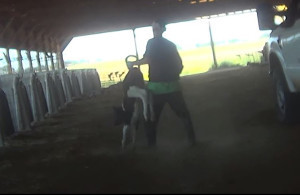 The abuse I documented at Quanah was both egregious and a regular occurrence. I witnessed workers violently drag calves by their limbs, kick them in the back, pull them by their ears, lift them by their tails, and flip them into trailers, resulting in them continuously landing on their necks. Even my supervisor partook in the abuse, and encouraged me to handle them roughly to speed up the loading as well. I quickly learned to make excuses for getting out of following those orders. I think my refusal to partake in any of the abuse resulted in me looking like a lazy worker, that to them was “slow.” All of the abuse these calves endured was utterly unnecessary, and happened out of sheer laziness of the workers, and a failure of the company to oversee the facility. A vast number of the calves were sick while I worked at Quanah, which resulted in many of their deaths. I’ll never forget my first day when my coworker called me over to show me a very small calf that he said was blind. The calf appeared to be extremely weak, and had even more difficultly walking because of his blindness. I witnessed my coworker repeatedly kick the calf to get him to stand, and throw him in the trailer like someone would throw trash in a garbage can. There were other calves that arrived at the facility with deformities in their hooves, making it almost impossible for them to walk correctly. Although the workers realized this, they still pushed and kicked these disabled calves off the trailers.
The abuse I documented at Quanah was both egregious and a regular occurrence. I witnessed workers violently drag calves by their limbs, kick them in the back, pull them by their ears, lift them by their tails, and flip them into trailers, resulting in them continuously landing on their necks. Even my supervisor partook in the abuse, and encouraged me to handle them roughly to speed up the loading as well. I quickly learned to make excuses for getting out of following those orders. I think my refusal to partake in any of the abuse resulted in me looking like a lazy worker, that to them was “slow.” All of the abuse these calves endured was utterly unnecessary, and happened out of sheer laziness of the workers, and a failure of the company to oversee the facility. A vast number of the calves were sick while I worked at Quanah, which resulted in many of their deaths. I’ll never forget my first day when my coworker called me over to show me a very small calf that he said was blind. The calf appeared to be extremely weak, and had even more difficultly walking because of his blindness. I witnessed my coworker repeatedly kick the calf to get him to stand, and throw him in the trailer like someone would throw trash in a garbage can. There were other calves that arrived at the facility with deformities in their hooves, making it almost impossible for them to walk correctly. Although the workers realized this, they still pushed and kicked these disabled calves off the trailers.
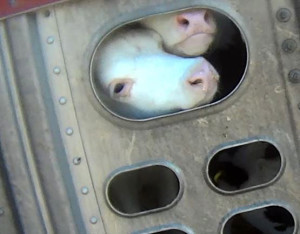
Seeing this amount of abuse, on top of being physically exhausted after a 12-hour workday, makes the job of undercover investigations extremely difficult. Due to the sensitive nature of investigations, no one other than my legal counsel knew what I was going through, which was one of the hardest aspects of my job. This is all on top of making sure I didn’t blow my cover with one misspoken sentence.
How did you learn about the charges against you? (Can you tell about being called into the station, answering questions, etc.)
RADIG: Prior to the public release of the investigation, Compassion Over Killing and I gave my evidence to the Weld County Sheriff’s Office. Only a few days after this, we were informed about the criminal charges being brought against three workers at the farm. I was told that I would need to give a formal statement and have my identity verified in person in order for them to move forward with the cases against the three other workers, since I was the only eyewitness. Although we had already furnished a lot of evidence and legal research, Lisa Winebarger, legal counsel for COK, and I agreed to meet with them to help them with their cases.
When we arrived in Colorado, I still wanted to keep my identity as anonymous as possible. I pulled my hair back, put sunglasses on and kept my head down as I walked into the Sheriff’s Office. The Detective we met with purported to understand the sensitivity of this case, and said that although he could make no guarantees because of Colorado’s open records laws, he would do what he could to attempt to keep my identity protected to the extent possible. Ultimately, of course, the Sheriff’s Office actively sent my name and mug shot to over 100 media outlets – clearly there was never any real intent to guard my identity despite legitimate safety and security concerns we voiced repeatedly.
“It all felt like a twisted nightmare…”
In the interview, after outlining the basic facts of the investigation, I was asked about the abuse I documented, and questioned as to why I didn’t report the abuse immediately. I reiterated that I needed to establish a pattern of abuse to ensure it wasn’t an isolated incident, and that if I came forward prematurely, the case would have been dismissed by law enforcement. I also reminded him that I was called in to work sporadically, and worked very few “transport” shifts, when the vast majority of the abuse was occurring.
At the end of the interview, the Sheriff walked out and came back with a small rectangular sheet of paper. He informed me that I was being charged with animal cruelty for failing to report in a timely manner, and would need to go to the jail to take mug shots and be finger printed.
What was your reaction?
RADIG: We went in knowing the law and knowing that I didn’t break it – I knew there was no mandatory reporting law in Colorado, and that someone in my position cannot legally have a legal duty to act. But the officer didn’t care about our arguments or the law. All he had to do was say he had enough for “probable cause.” It all felt like a twisted nightmare; I witnessed and reported animal abuse, flew into Colorado to facilitate the cases against the other three, and now was being charged with a crime myself. Most frustrating, though, was that Quanah’s management, who does have a duty in all of this, and who permitted all of the abuse to happen by inadequate training and oversight, is facing no consequences. I think that really reveals the Sheriff’s Office’s true motives.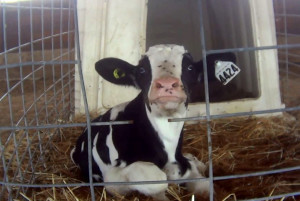
Part of the allegation is based on not reporting the abuse immediately. Can you explain why, as an investigator, it is important to collect evidence beyond the first instances of cruelty observed?
RADIG: One of the most important aspects of investigations is to establish a pattern of abuse, so we can prove to law enforcement that the documented abuse is not just an isolated incident. If I had come forward immediately like the Weld County Sheriff’s Office wanted, the routine abuses at Quanah would certainly have been swept under the rug. It’s important to note, that despite what the Weld County Sheriff’s Office is suggesting, there is absolutely no legal requirement in Colorado that one come forward with evidence of animal cruelty, much less within any specified period of time. I think it’s also worth mentioning that my citation notes that my “offense” occurred precisely between my first and last day at Quanah. To me this shows that wearing a hidden camera at all, even on my first day, is what bothered them.
What are the potential consequences of this for you, both personally and your work?
RADIG: One of the hardest parts about this situation for me personally, is knowing my career as an undercover investigator is over. I never wanted my identity to be publicized, because this isn’t about me, it’s about catching animal abuse. However, despite our repeated requests for them to treat my case with sensitivity and protect my identity (at least initially), they went ahead and sent my mug shot to over 100 media outlets, and plastered my face everywhere they could think of. You can even find my mug shot on the WCSO Facebook page, with no mention of the other three that were cited, much less any other recent arrests.
I’m in school right now, and finishing up my degree in philosophy and biblical studies. If I’m convicted as unlawfully as I was cited, I could spend my last semester in jail. In addition, I would have to explain to future employers about the animal cruelty charge, because it will show up on a standard background check. However, I know everything I did was within the law, and we’re not going to take this lying down. Public outcry about the absurdity of my charges has been overwhelming, especially in Colorado. I want everyone to see what I’ve seen, so we as consumers can start to make some real changes in what we are willing to support and not support. Interacting with many of the animals during my investigations and the amount of abuse I’ve witnessed, I don’t think there is anything that will stop me from advocating for their humane treatment.
This is clearly part of the larger trend of the industry attempting to silence whistleblowers, such as through ag-gag laws. What do you think is the motivation behind this prosecution? What message is trying to be sent (and is it successful?)
RADIG: The way in which my charge was brought about, and other aspects of how they’ve handled this case, makes us believe my charge is absolutely politically motivated. Just recently, John Cooke has come under fire for choosing not to enforce even modest gun control laws because they conflict with his own personal political feelings about the Second Amendment, despite that it is his job – and that he took an oath – to enforce them. In general, it appears that he only adheres to the laws if it conforms to his political ideologies, which is scary in terms of the position of power he’s in. In fact, he’s currently seeking more power, by running for state office in Colorado.
Every aspect of my undercover investigations was legal. With this being said, it can take a long time to develop cases that lead to a successful prosecution. Their motivation behind my charge has to do with mandatory reporting, something not required in Colorado. However, actual mandatory reporting requirements that are included in “Ag-Gag” bills seek to outlaw the legality of investigations. It’s a threat that compromises consumer knowledge, and will further conceal the day-to-day cruelties and abuse in animal agribusiness. This seems to be their mission: to hide the abuse from the public. If it’s hidden, no one will be questioning their practices; the same practices that cause massive public outcry when these investigations come out. The abuse that investigations expose is extremely difficult, if not impossible, to catch during routine inspections. This is what makes investigations worth defending against these laws.
Join nearly 200,000 others in signing this petition!
January 6, 2014
Is he your best friend? Or an undercover cop?
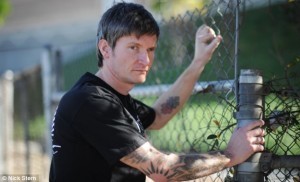 The story of Mark Kennedy, the undercover cop who targeted social activists throughout Europe, was shocking to activists and the general public alike — among them Kennedy’s former friend Jason Kirkpatrick. Now, Kirkpatrick is creating a documentary about Kennedy’s spy ops. He’ll be in New York City and San Francisco this month to preview clips from Spied Upon.
The story of Mark Kennedy, the undercover cop who targeted social activists throughout Europe, was shocking to activists and the general public alike — among them Kennedy’s former friend Jason Kirkpatrick. Now, Kirkpatrick is creating a documentary about Kennedy’s spy ops. He’ll be in New York City and San Francisco this month to preview clips from Spied Upon.
I caught up with director Jason Kirkpatrick him in advance of this to talk about his work:
Q. While the scandal surrounding former British undercover policeman Mark Kennedy is well known in the UK and Europe, it’s not commonly known about in the USA. Why is the Kennedy case important for North American activists?
A. Kennedy went deep undercover starting in 2003 in England, targeting Earth First!, which has been a main focus of FBI repression since the late 1980′s. Kennedy spent an incredible 7 years spying on various environmental and social justice movements across Europe, and also in the USA. He worked under contract for the FBI, and his story has received some coverage in Rolling Stone and the New York Times even, although this story has not broken much in activist circles for some reason.
Q. Explain the connection with private security firms.
A. The information exposed because of the Kennedy scandal has allowed us to see more clearly the links between private corporations and private security firms, and their often illegal collaboration with private security firms and politicians. In the UK, it came out for example that energy companies such as BP have hired private spies to keep tabs on climate changes activists, especially from groups such as No Dash For Gas.
Interestingly, before Mark Kennedy’s seven year undercover operation came to an end as his unknowing activist girlfriend figured out he was a spy, he had actually started a private security firm of his own. He was traveling across Europe too, for examply, saying he was an Earth First!er and spying on animal rights groups in Italy. In 2013 Kennedy testified in the British Parliament, saying he is advising the Los Angeles County Sheriff’s Department, as well as a private security firm called the Densus Group.
Q. Is all of this a big issue in Europe?
A. The specific case of Mark Kennedy was a scandal in Germany, and debated in the parliament, partly because police say they sometimes didn’t know why Kennedy was operating in Germany, or why he committed two crimes, including an arson in Berlin, around 2007/8. In the UK, it has come out that private spying has been unregulated, and the parliament there passed new laws in 2013 to bring the out of control private spying operations under control. However, these laws have not gone far enough. They still need to do things like ban sex between undercover spies and activists, which has been a big problem. International spying operations apparently are also unregulated in Europe. The case of Kennedy working for the FBI, and saying he got a commendation for his FBI work, also proves that the security apparatus in the USA is involved in these scandals as well.
Q. Do you know of any other similar issues in the US?
A. One big case that has never been explained, is why the FBI wrongfully arrested Earth First! activists Judi Bari and Darryl Cherney in 1990. The FBI paid out millions in damages to these two activists for wrongfully blaming the two for bombing themselves, but to this day the FBI has never actually tried to find out who tried to kill Bari and Cherney. Darryl recently made an award winning film called Who Bombed Judi Bari, yet the FBI still doesn’t want to investigate even though some fingers clearly point to the timber industry as those with motivations to stop plans for the Redwood Summer protests being planned. This and further issues detailed in the film makes one wonder about the cozy connections between the FBI and timber industry working together to attempt to damage or destroy Earth First!. I met Judi Bari, who lived in Willits, California where I went to High School, and I feel that justice needs to be served on this important case.
Q. What do you hope to achieve with your film Spied Upon?
A. There needs to be more consciousness about how governments work with corporations to deliberately damage popular social movements, and I hope this film helps to raise that consciousness. Also, the way the media covers the internet spy stories as revealed largely by Edward Snowdon, is done in a way that is very impersonal, and can feel quite distant for those reading about this kind of spying. I want to make a film that shows the personal stories and human effects of spying, especially the use of undercover police targeting activists. I hope that revealing this human aspect, as well as showing people how to take action in the film, will motivate people to continue sustained activism and not feel powerless.
For further information and video clips, visit www.spiedupon.com.

